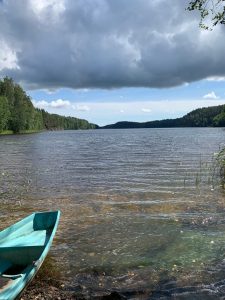Erlin Trifoni from the University of Toronto spent his ten-week internship in the Aleksanteri Institute as a part of an exchange program. In May-July he conducted a research project on Finnish migration policy and its challenges in the current world situation.
On April 24th, I started my 10-week internship at the Aleksanteri Institute as an intern from the University of Toronto. The time of my arrival coincided with the consequential decision of the Finnish Government to entirely abandon its policy of neutrality to join the North Atlantic Alliance (NATO) as a result of the invasion of Ukraine by the Russian Federation. However, the war in Ukraine did not only shape Finland’s foreign policy and security configuration; it also tested the ability of its immigration system to cope with a large influx of Ukrainian refugees in a relatively short time frame. At the same time, Finland was also facing the issue of Russian citizens escaping conscription, which caused a temporary spike in the number of asylum applications.
After consulting with my supervisor, Dr. Anna-Liisa Heusala, I decided to work on a report investigating the strengths and weaknesses of the Finnish immigration system within the context of the refugee crisis caused by the Russian invasion of Ukraine. My paper’s objective was to dissect Finland’s response to the Ukrainian refugee crisis. The analysis represented a point of departure for a more thorough comprehension of the features of the current mechanisms governing the immigration phenomenon in the country. In essence, what does the administration of the refugee crisis in Finland tell us about the strengths and weaknesses of its immigration and integration system? By looking at the issue comprehensively, it is possible to discern that the overall response of Finland to the refugee crisis caused by the Russian invasion of Ukraine has been positive in the pro-activeness of logistically and politically welcoming Ukrainian refugees. However, enhanced attention should be placed on service provision where the country has displayed difficulty meeting service demand. The country’s current performance indicates that it is necessary to increase cooperation with nonprofits and private entities.
Furthermore, the invasion of Ukraine promoted mobility among Russian citizens, particularly those escaping the forced conscription imposed by their Government. In this realm, my project started with the manifested preliminary intention of former Foreign Minister Pekka Haavisto to develop a humanitarian visa program dedicated to Russian citizens escaping conscription. I built two arguments: one in favor and one against the proposal. Doing so required a thorough analysis of the historical and current dynamics of Finnish-Russian relations since the foreign policy of Finland often intersects with its immigration policy, especially within the context of immigration from Russia. Those are just two arguments I have made in my report.
I had the opportunity to interview academics from the Finnish Institute for International Affairs (FIIA), the Aleksanteri Institute, the Migration Institute of Finland, and the Cultura Foundation. Furthermore, considering that my project was centered around the response of the Finnish State to the Ukrainian refugee crisis, setting up interviews with Government officials represented a core component of my work. This aspect was undoubtedly one of the most challenging, as the accessibility between different governmental agencies varied considerably. However, one member of the Ministry of Interior agreed to participate in the project, and their interview provided valuable insight into the actions Finland has taken and aims to take in the future to further respond to the Ukrainian refugee crisis.

Before starting my internship, I did not expect to be able to work on my own project and engage with various actors in Finnish society. Completing the paper has not been smooth sailing, however, as I encountered a few hardships along the way, especially during the process of scheduling interviews. Nevertheless, those moments were critical in comprehending that patience is a valuable friend and that regardless of how many rejections you may experience, results will materialize as long as you remain consistent in pursuing your objective. The trust and responsibility enshrined in the assignment of this project anchored me to the goal ahead and allowed for a successful completion of the task. It was an enriching and pivotal experience that cemented my desire to continue working in academia in the near future. I want to use this occasion to reiterate my thankfulness to Dr. Heusala for her guidance and expertise, the Aleksanteri Institute, which welcomed me in its rigorous work environment and treated me like a colleague, and the various academics, organizations and Government officials for their valuable contribution to my project.
By Erlin Trifoni
